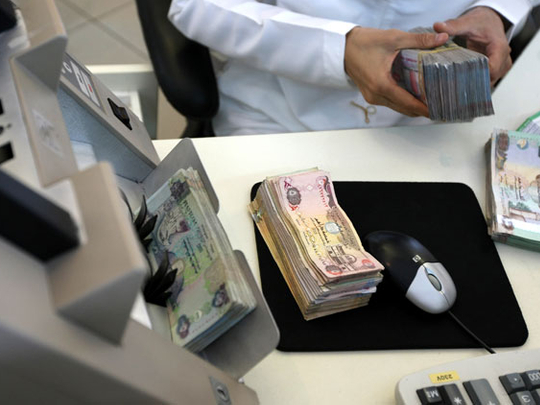
Dubai: Every UAE resident maintains nearly two deposit accounts on average, according to a World Bank report released Thursday.
"There is a wide variation among countries in the region in terms of deposit account penetration, from 104 bank accounts per 1,000 adults in Yemen, to 1,751 bank accounts per 1,000 adults in the UAE," says the report, Financial Access 2010.
"Average deposit size per capita is much higher in Mena, at 260 per cent, than in developing and high-income countries."
In the Middle East and North Africa (Mena) there are 818 bank accounts per 1,000 adults, compared with 635 bank accounts per 1,000 adults in developing countries, the report said.
Mena had a lower median growth rate in the number of accounts per 1,000 adults, compared with both high-income and developing countries.
However, Morocco had a high positive growth rate at 8 per cent. Most deposits are held in commercial banks in all reporting Mena countries.
Last April 2,273,290 cheques were deposited in banks by customers, amounting to Dh84.2 billion, according to the UAE Central Bank.
During the first four months of 2010, the UAE banking system handled about 398,190 transactions worth Dh2.71 trillion, statistics show.
Access
Yet access to capital remains out of reach to most bankable consumers, especially when they need it most.
Dr Eckart Woertz, Director of Economic Studies at the Gulf Research Centre, says, "Access to consumer credit was too easy during the boom. Mortgage finance on the other hand is hard to find in the UAE."
A large number of low-income expatriates had largely remained out of the banking system. That has changed with the introduction of the Wage Protection System (WPS), as their monthly salaries are channelled through the banks.
Dr Amjad Hussain, Professor of Economics at Al Ain University, said, "For a long time, the majority of UAE residents, especially the labour force, remained out of the banking system. However, now that they have been brought under the system, the banks could start meeting their financial needs.
"These low-income wage earners are now part of the banking network and their details are in the database. So, there is a credit history building up already that could help the banks decide on the loan amount and terms," he said.
The UAE banks could also extend micro-credit to support small businesses and entrepreneurship development, from which they have been shying away from.
"There is nothing that prevents the banks to extend micro-credit. The banks in the UAE could start offering micro-credit, if they believe in their potential," he said.
However, the local bankers will have to change conventional banking culture. "Conventional bank lending focuses on equity value, not the potential of borrowers. And most borrowers in the UAE would be foreigners," he said.
However, Dr Woertz feels, the banks should improve their services first.
"Overall there are many banks in the UAE, the problem is sometimes the service quality."
In Mena there are 201 bank loans per 1,000 adults compared with 245 bank loans per 1,000 adults in developing countries.
There is a wide variation among countries in the region in terms of loan account penetration, from 926 bank loans per 1,000 adults in Israel to only 8 bank loans per 1,000 adults in Yemen. Non-bank financial institutions (NBFIs) target lower income segments, but limited data do not allow for a comprehensive assessment of their role.
The change in the number of accounts on average in Mena was 12 per cent, higher than the average increase in high-income countries. The number of loans per 1,000 adults rose the most in Lebanon at 13 per cent but fell in Israel by 2 per cent.
Consumer protection needed
Dubai: The recent financial crisis highlighted the importance of effective consumer protection and adequate levels of financial literacy for the sustainability of the entire financial system, the report says.
"Basic consumer protection requirements are on the books in most Mena countries. Eighty-three per cent of Mena countries (10/12) have laws and regulations addressing at least some aspects of financial consumer protection while 75 per cent have some sort of fair treatment legislation restricting unfair selling practices," it says.
On average, Mena countries require the most periodic disclosure requirements surveyed by Financial Access 2010 out of every region, tied with Latin America and the Caribbean.
Enforcement mechanisms are weaker than legislative requirements. Nine Mena countries require fin-ancial institutions to implement procedures for resolving customer complaints, and only six Mena countries have at least one dispute resolution mechanism.
Inspection
Onsite inspection is the only compliance monitoring mechanism that exists in more than half of Mena countries, and issuing warnings to financial institutions and imposing fines are the only enforcement actions that are taken by regulators in more than half of Mena countries.
Institutional structures are the weakest. Two-thirds of Mena financial regulators who said they were responsible for some aspect of financial consumer protection have a dedicated unit to work on these issues.
Promising Trends
The report shows promising trends, including the expansion of retail infrastructure and use of new technologies to deliver financial services cost effectively.
Globally, one bank branch, five ATMs, and 167 point-of-sale terminals were added per 100,000 adults in 2009.
For the first time, the number of ATMs exceeded the number of bank branches in low-income countries. But low- and middle-income countries still lag behind high-income countries in terms of physical outreach.
"New technologies such as mobile payments and internet banking are likely to further reinforce this shifting picture of financial inclusion," said Oya Pinar Ardic, an author of the report, Financial Access 2010.
Have you applied for a loan recently? Were you rejected? How are you coping?












